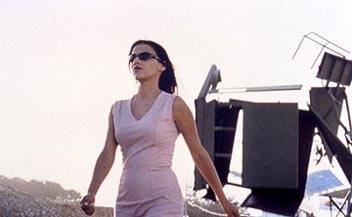
|
Divine Interventionby Kevin ChenJune 27, 2003
A man in a Santa Claus suit being chased by a mob of not entirely gleeful children; a man who accumulates vast stockpiles of beer bottles on his roof; a man who seems intent waiting for a bus even when told that there is none: these are some of the characters the audience is introduced to and observes during the hour and a half running time of Divine Intervention, an absurdist comedy set somewhere between Jerusalem and Ramallah. Setting a comedy in a place where the cycle of violence is so ingrained that it's impossible to tell what is an attack and what is a reprisal seems like a tall order, but writer/director (as well as star) Elia Suleiman actually sidesteps most of the Israeli/Palestinian tensions, choosing to acknowledge them only at a checkpoint where armed guards regularly halt vehicles to inspect the credentials of their occupants. Instead, he focuses on the smaller conflicts between neighbors whose Hatfield and McCoy antics are clearly meant to stand in for the larger struggles of the region. The pace of the film is deliberate, and we are introduced to the characters in the vignettes bit by bit as interwoven glimpses of the stories unfold. Audience members with poor short-term memories (or a lack of patience) may have problems following the events to their proper punchlines. This is exacerbated by two things: a remarkable paucity of dialogue, and the very minimalist direction, which makes extensive use of long shots from a fixed and immobile position. In fact, it is often necessary to identify characters geographically or situationally since only a handful (and not including the two "principals") are actually referred to by name. Not only does the screenplay gloss over identity, but ethnicity as well; the only characters readily identifiable as Israeli are a man sporting a yarmulke and soldiers at a checkpoint. It is impossible to tell whether this homogeneity is meant to suggest that neither group is ultimately different from the other, or that the insanity of the world they live in strips those differences away such that it simply doesn't matter any more. It would not be at all surprising to discover a bit of truth to both hypotheses. The laconic inscrutability of most characters will likely prove to be perplexing and perhaps frustrating to even the most ardent of independent filmgoers, particularly the character who occupies the most camera time, a young man who goes without either identification or dialogue until the closing credits, where he is simply referred to as "ES". ES has no lines in the film, and occupies most of his time staring out windows, although he does occasionally look in the direction of his father, and a beautiful woman (Manal Khader) with whom he has an unusual relationship which consists entirely of wordless rendezvous in a car outside an Israeli checkpoint. Still, there is a palpable tenderness in these relationships even past the inability of the characters in them to articulate, well, anything. Where American audiences may find the narrative less than satisfying, they will be able to content themselves with a palette of memorable visuals, particularly given Suleiman's penchant for allowing the camera to continue in a scene even when more conventional direction would have moved on to the next scene. Instead, the audience can contemplate a number of strikingly framed visuals, including a panorama of the hills of Nazareth, a sultry sequence consisting solely of hands, and a vividly red balloon adorned with a portrait of Yassir Arafat which boldly makes its way across the Israeli-Palestinian border. Most striking of all, however, is the film's final image, which I will not reveal here, but suffice it to say that, unlike the rest of the film, is plainly decipherable. Divine Intervention is not a crowd-pleasing film. Its humor is too sporadic, its characters are undefined outside of their sitcom roles, its imagery is difficult to decipher without the proper cultural contexts. Those who are attentive and are willing to scrutinize the film for clues may find a hidden treasure concealed therein, but many will find that it's simply not worth the effort.
|
Sunday, December 28, 2025
© 2006 Box Office Prophets, a division of One Of Us, Inc.